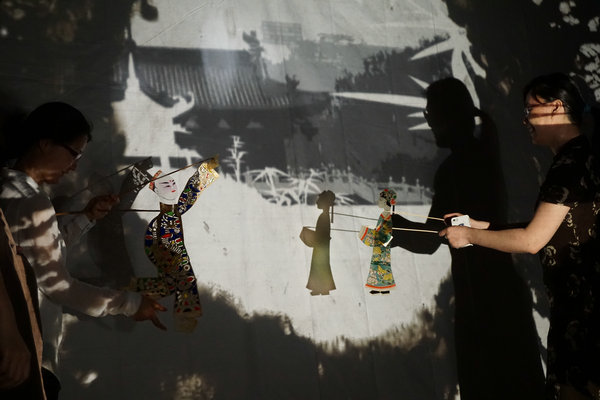 |
|
Two volunteers display a shadow puppetry program combining traditional and modern elements during a workshop.[Photo/China Daily] |
It is one of the oldest performing arts in the world with a history dating back to the Song Dynasty (960-1279). Here, Li Rong, who runs the Mini Shadowplay Festival, preparing for its second edition in Beijing and Shanghai next month, explains how she fell in love with it and what she is doing to give it a makeover. Chen Nan reports.
When an art form is seen as living heritage, it not only indicates its historical and cultural value but also means it is in decline. That's how Li Rong thought about Chinese shadow puppetry, one of the oldest performing arts in the world with a history dating back to the Song Dynasty (960-1279), when it became part of UNESCO's Intangible Cultural Heritage of Humanity in 2011.
However, after seeing a series of live shadow puppetry shows staged at theaters in Huaxian county, Shaanxi province, in 2009, she developed a different perspective about the ancient art form, which led the 25-year-old to embark on a journey of researching, promoting and reviving it.
"I was fascinated by the techniques of the puppeteers, such as improvisational singing, simultaneous manipulation of several puppets and their imagination. I did not want it to die," says Li, who graduated from the Beijing Language and Culture University in 2012.
In 2014, she decided to become a full-time promoter of the ancient art.
From 2009 to 2014, Li traveled to many places in China to watch shadow puppetry shows. She also visited Indonesia, Thailand and India, where shadow play has a long history, and where they are able to keep the tradition alive through religion.
Then, around two years ago, she read about Shadow Liberation, an interactive shadow theater ensemble directed by American drama therapist Evan Hastings, who uses shadow puppetry to talk about gender violence.
She contacted Hastings and over April 2-17, Hastings will be at Beijing's National Library and Shanghai's Theater of 1933 Old Millfun for the second edition of the Mini Shadowplay Festival. He'll be joined by five members of his theater group, including Rajeev Pulavar, an award-winning shadow puppeteer and educator from Kerala in southern India and Bengaluru-based theater artist, film actor Madhukar. They will deliver lectures, hold performances and conduct workshops.
They will use the Indian epic, the Ramayana, as an original text and will work on it with local artists to start a dialogue about gender equality.
"Last year, Hastings performed in Shanghai and Beijing as a solo artist," says Li, who founded Mini Shadowplay Festival in 2015. "Then, we opened up the backstage and let the audience get a taste of the shadow techniques. We will continue the interaction this year too."
In the festival's first year, with support from online funding, Li invited three veteran shadow puppetry artists from Xiangtan city in Hunan province. They not only performed at the event, but also interacted with the audience by displaying and teaching their craft of carving the puppets.
This year, the festival is partly funded by One Lab, a project under the charity organization One Foundation.
Li says that the performance last year was staged in the center of the venue, to enable the audience to see backstage.